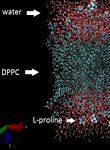|
|
|
Role of L-Proline in Stabilization of Biological Membranes
|
|
|
|
|
|
|
|
|
|

|
|
|
|
Lindong Weng, PhD
|
|
|
|
MGS-Harvard Medical School
|
|
BioMEMS Resource Center, MGH-HMS, 114 16th St., Charlestown, MA 02129
|
|
lweng1@mgh.harvard.edu
|
|
|
|
|
|
|
|
|
|

|
|
L-proline, a natural α-amino acid, has been found useful as an osmoprotectant and antioxidant. It can prevent the denaturation of peptides and increase the survival rate of freeze-dried fungi by inhibiting the generation of intracellular reactive oxygen species. L-proline was shown to effectively preserve the structure and function of the frozen vesicles. But there is evidence showing that L-proline was able to destabilize the lamellar liquid-crystalline phases in both fully hydrated and freeze-dried lipids, which is undesirable. Given the complex role of L-proline in the stabilization of biologics, the current study conducted molecule dynamics simulations of hydrated 1, 2-dipalmitoyl-sn-glycero-3-phosphocholine (DPPC) bilayers in the presence of L-proline to elucidate the interactions between L-proline and lipid bilayers. The results show that the proline molecules can slightly perturb lipid headgroups with an occasional insert of proline molecules between lipid headgroups. In the fully hydrated state, proline molecules prefer to hydrogen-bond with water molecules rather than lipids. The MD simulation results do not support the 'water replacement' hypothesis for the mechanism of membrane protection by proline.
|
|
|
|
|
|
|
|

|
|